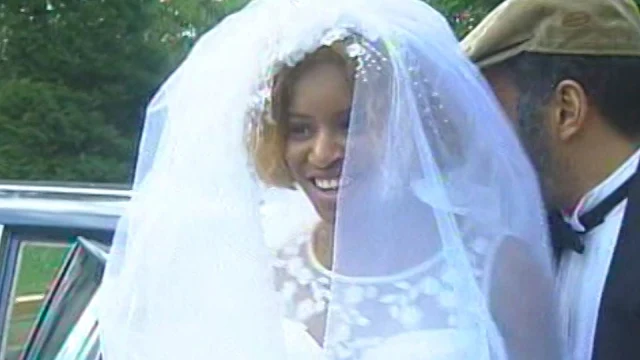 |
| Nicole Dogué in French Wedding, Caribbean Style |
Cast: Dieudonné, Loulou Boislaville, Nicole Dogué, Daniel Njo Lobé, Lucien Thérésin, Emile Abossolo M'bo, Ériq Ebouaney, Emilie Benoît. Screenplay: Julius-Amédée Laou.
You can't count on much help from the internet if you want to know more after watching Julius-Amédée Laou's French Wedding, Caribbean Style. There's precious little about the film on the usual sources like IMDb and Letterboxd. But it's a refreshing, noisy, chaotic treat that takes on all sorts of subjects: racism, colonialism, sexism, and any number of cultural conflicts in an amusing but bittersweet, insightful, provocative way. The setup is simple: a young white Frenchman and a young woman whose grandparents immigrated to France from Martinique in the 1930s arrive at the reception after their wedding, which is being held at the home of her parents. The event is being recorded by her younger brother on a video camera, and we see everything through that lens. There are the usual family tensions on display -- get any large family, no matter the ethnicity, together and you'll witness them. The groom's parents, an uptight couple, are not terribly happy with the marriage, but even among the bride's relatives there's some conflict. Still, everything proceeds noisily as the young videographer pokes his camera's nose into what's going on. But midway through the film, an uninvited guest arrives: the bride's old boyfriend, who throws a bombshell into the occasion. His "wedding gift" is another videotape, and a shocking one. At this point, as the reception turns into an uproar, the camera falls into the hands of the bride's younger sister, who has an entirely different attitude toward what's going on. That shift in point of view opens up a new perspective on the proceedings. I have to say that I found the ending of the movie a little more didactic and conventional than I'm entirely happy with, but I still admire the huge ensemble cast and the energy and artistry with which Laou has put together this boisterous film. If you subscribe to the Criterion Channel (and you should), you owe it to yourself to check it out.